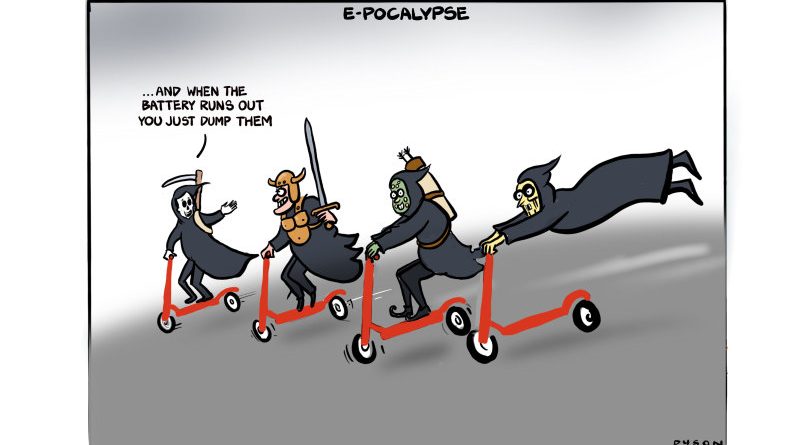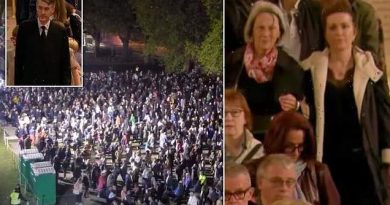This footpath joyriding comes at a cost
Save articles for later
Add articles to your saved list and come back to them any time.
Credit: Illustration: Andrew Dyson
To submit a letter to The Age, email [email protected]. Please include your home address and telephone number below your letter. No attachments. See here for our rules and tips on getting your letter published.
SCOOTER INJURIES
The rise in injuries and community cost of widespread use of e-scooters is not surprising (“Call for action as e-scooter injuries rise”, 20/12). They have been sold to the community as an active transport mode to reduce car use for commuting with a positive health and climate change effect. But unlike bikes and walking, which have positive health benefits with a consequent cost saving to the community, e-scooters need no physical effort and have a negative effect on health costs. While their use for commuting may reduce some car use, in many cases they simply replace a tram, train or a walk.
However, it’s their high use for joyriding on paths along the Yarra, Birrarung Marr and similar recreation locations that is a major problem. The commercial operators incorrectly claim the statistics from these joyrides as evidence of their use as an active transport car-replacement mode. Their interest is really profit driven, not a supposed public benefit.
Chris Trueman, Southbank
Identify the riders
If e-scooters had number plates, the problems caused by irresponsible scooter riders (footpath-riding, speeding, not wearing helmets, drunken driving, littering) would be greatly reduced. The ubiquity of the smartphone would ensure that the public would provide the authorities with adequate photographic evidence for the prosecution of offenders.
Peter Murray, Bulleen
Immobilise rule breakers
If it is possible to immobilise and corral an e-scooter within certain boundaries, surely it is also possible to immobilise that scooter unless its accompanying helmet is within, say, two metres. The next step, perhaps a little harder for my 78-year-old brain, might be to detect whether that helmet is actually being worn while the scooter is in motion, and once again immobilise it if this is not the case. We really are only half-using available technologies.
Michael Rumpff, Fitzroy North
Follow the lead of Paris
The warning about e-scooter injuries was timely. The action that is required is obvious. The state government needs to immediately abandon its supposed scooter trial and follow the lead of Paris, which earlier this year sensibly banned e-scooter rentals.
Dennis Walker, North Melbourne
Pity the cyclists
Reports that the incidence of injuries to e-scooter riders is no greater than that sustained by cyclists confirms just how dangerous it is to ride a bike on Melbourne roads.
Kay Howden, Northcote
Educate, then enforce
Please will the City of Melbourne educate e-scooter riders, bike riders, motorbike food delivery drivers, and all riders about the laws and enforce them? I stood for an hour at the intersection of Flinders and Spencer streets yesterday at 4pm and counted 120-plus infringements. Educate all riders. Enforce the laws that all riders must stay on the roads and off the footpaths.
Tony Moore, Docklands
Sharing safety, not footpaths
Recently, I took one step through my front gate and was hit by a teenage boy on a bike. It was so unexpected and shocking. I live on a busy road with a narrow footpath and with no nature strip. I was about to admonish the boy who hit me when I saw that he was as shocked and upset as I was. I asked him why he was riding on the footpath with a bicycle lane on the roadside one step away from him. He said his mum had told him it would be safer. “Shared” implies equality. There is nothing shared about a footpath with a moving bike and rider on it.
Sue Currie, Northcote
THE FORUM
Imported values
The City of Melbourne is considering lighting Royal Park. Cr Rohan Leppert says: “Everyone deserves to feel safe in our city, no matter where they are or what time of day.” (“The push to keep city’s last dark park unlit”, 20/12).
But it’s a historical fact that lighting didn’t prevent the murder of Keith Hibbins in Fitzroy Gardens on April 25, 1999. And it isn’t a principle of good city design that everyone should have everything they need everywhere – because it isn’t possible.
Nobody wanders through the NGV at 3am. Nobody feels safe walking across the Westgate Bridge, ever. It’s devastating that limits of freeways are accepted, while our parks must be infinitely accommodating – until they become a bit of everything but so little of anything in particular that their use for freeways is no concern.
Royal Park is an equivalent of the NGV. One is not pure nature any more than the other is pure art.
People play football in the park. Children play in the sculpture garden. Both have car parks, and clubs’ rooms or members’ lounges. But there is a need for limits and priorities, based on the values of each place. Emotive posturing about what “everyone deserves” doesn’t help clarify those values.
Ronald Jones, South Melbourne
Not present
Australia’s apparent refusal to provide a combat-ready naval ship capable of air defence warfare to join the United States-led coalition defending the Red Sea from Houthi terrorists fills me with despair (“Red Sea security taskforce won’t include our ships”, 20/12). This is an abrogation of responsibility by the Albanese government. Is the navy degraded to such an extent that it is incapable of providing an air warfare destroyer in defence of international shipping lanes?
Prime Minister Anthony Albanese downplayed the notion that Australia rejected a formal request from the US to join its multinational taskforce. However it should be noted that ships are being provided by Britain, Bahrain, Canada, France, Italy, Netherlands, Norway, Seychelles and Spain. It is obvious that none of these countries would be providing the support if it wasn’t at the request of the US. Albanese’s explanation reflects badly on Australia in international affairs.
Greg Angelo, Balwyn North
Disobeying orders
At last, Australia has refused to join an American military adventure by refusing to send a warship to the Red Sea as a pretence for stopping the Houthis attacking shipping plying their trade via the Red Sea.
Whenever Uncle Sam wants to flex its military muscle, several underling nations are ordered up to provide a consensus appearance for the operation.
Ian Hetherington, Moama
Revive the Drum
So now The Drum is dead, a victim of chaos at the ABC (“Why Q+A stays as ABC swings the axe”, 20/12). I, for one, am sorry to see it go. ABC management has made a misstep in its decision to axe this program. As the public broadcaster, programming should never be about ratings. In this age of online trolling, hate speech and conspiracy theories, The Drum held an important space for respectful dialogue about the issues of the day. Panel members were invited because of their lived experience or expertise.
It was never sensationalist but a considered conversation about key topics affecting Australian lives.
Beverley Campbell, Castlemaine
Voice for youth
I first went on The Drum in 2020, aged 18 in the thick of COVID-19 as I was completing year 12 VCE, where I discussed the lack of connection students had with teachers. A year later, I went on and spoke about the disparities within the VCE system. The Drum allowed me, as a student, to voice my concerns and highlight the inequities that prevailed in my year 12 and the years that followed. The program did not make me fit their desired story. In the last episode, they ended on a quote by Richard Flanagan: “Desperate is always rational, hope is always human.” The Drum showed me hope there is a space for young peoples’ opinions, views and wants. I thank it wholeheartedly.
Rosie Thyer, Northcote
Rural health risk
Thanks to The Age for uncovering secret government proposals for “forced mergers” of rural hospitals (“Local health services face mergers, shared wait lists”, 20/12). This is devastating news for everyone in Victoria’s regional communities. Predictably, “service rationalisation” will accompany mergers, and a reduction of local health services within rural towns.
Local hospitals run by boards with significant local representation and led by local management teams offer the best approach to ensuring the right services are provided as close as possible to home.
Our hospital in Yea is the major employer in town, was built in the 1940s through local fundraising as a memorial to those who served in World War II, and today provides a comprehensive and innovative range of acute, residential aged care and community-based services. All will be at risk if these secret proposals are realised.
Jan Beer, Yea
Protect the local
I am afraid the idea of hospital mergers isn’t new; there has been a litany of amalgamations, reorganisations and small hospital closures for 40 years in Victoria. And quite often the result is that a small town ends up with a lesser public hospital service.
When Dr Richard Scotton oversaw the establishment of rural health regions in the 1980s, the idea was that these departmental local offices would co-ordinate health services in their particular areas. I believe such regional offices still exist in the Health Department and they should be the logical focus of hospital co-ordination and planning within their geographical boundaries.
David Fry, Moonee Ponds
Better now than later
For years, the focus by state governments on getting to the next election, avoiding controversy and underestimating project costs led to short-term planning on major infrastructure, especially transport. As a consequence, we have a radial rail network and incomplete ring road.
Those who decry the state government’s efforts to build a Suburban Rail Loop and the North-East Link should imagine Sydney without its world famous Opera House or London without its wonderful underground railway.
In the late 1950s, the Opera House was originally estimated to cost £3.5 million ($7 million) and take four years to build. It actually took 14 years and cost $102 million (c $1.4 billion today), a 17-fold increase. Criticism was deafening as costs soared and construction delayed. The London Underground faced similar disputes and cost overruns.
Melbourne needs cross-city rail routes and there is a compelling case to complete the ring road. In 50 years, our city’s population is projected to be 10 million. Future citizens will be grateful that these major projects were completed.
James Young, Mt Eliza
Obvious cost
I have been opposed to the North East Link freeway since its inception for a host of environmental and social-equity reasons. It now appears that not only will this dud project wreck the environment and damage our health in the north-eastern suburbs but we will also drown in massively increased debt (“North East Link costs blow out by $10 billion”, 16/12).
I find it staggering that Treasurer Tim Pallas hadn’t previously factored expanded compliance with environmental regulations into the business case.
Since when is compliance with environmental law an optional extra? It seems we have learned nothing since the myopic car-centric thinking of the 1950s.
John Young, Blackburn North
Progress delayed
Your correspondent (Letters, 20/12) says that while North East Link is needed, the requirement to widen the Eastern Freeway is dubious. This misinterprets the project, which is to cater for increased road traffic through the eastern suburbs and into central Melbourne. It is another step in preparing the ground for the
East West Link which was abandoned in 2014 by the incoming Labor government, and which was described by Daniel Andrews as “a dog of a project”.
It is significant that in the following nine years, there have been no worthwhile steps taken to improve public transport in the corridors they have mapped out for the North East Link.
Ian Hundley, Balwyn North
Market rationality
As ever with Ross Gittins (“Price hikes hit PM where it hurts”, 20/12), the narrative informs the analysis. It is not because “in a market economy, when our demand for goods and services exceeds the economy’s ability to supply them, businesses solve the problem by putting up their prices”. It is because when our demand exceeds the economy’s ability to supply the goods and services we want, we bid up the price of those scarce goods and services. When and if we reduce our demand, businesses “lower” prices in order to sell their stuff.
Businesses respond to consumers not the other way around. The higher interest rates manifest government’s accepted policy (through the RBA) of increasing the price to us for our excess demand. The market has many failures, but a lack of rationality is not one of them.
Douglas Shirrefs, Yea
Blow up the fireworks
If householders can create exotic lightscapes (“Festive Light Shows you simply can’t miss”, 19/12), why do we still have the old-fashioned, highly polluting fireworks shows on New Year’s Eve? As among the first cities to greet the new year, it’s time for Sydney and Melbourne to set a precedent with celebrations that do not end in clouds of smoke and drop poison in the harbour, bay and rivers.
David Muir, Kensington
AND ANOTHER THING
Red Sea
I am sure that if Anthony Albanese had agreed to send a ship to the Red Sea, Sussan Ley would have protested that he should be more concerned with the Asia-Pacific region.
Marie Nash, Balwyn
If the reason Australia’s warships can’t protect sea lanes near land is because they don’t have adequate protection against drones, the use of which is now ubiquitous, why not and what use are they?
Ian Pitt, Brighton
Benbrika
Dan Tehan and the Liberal Party blame the Albanese government for terrorist Abdul Nacer Benbrika’s release. The Liberal Party were in power from 2013-2022 and were unable to prevent his release.
John Nash, Altona
Furthermore
I can’t help but need a restorative break after reading “Mum’s the word” (The Age, 20/12). The author writes about the benefits of having a kid-free break and states that even the most chilled out children demand a lot of their parents. Yep, that is what parenting is about.
Julie Ottobre, Brunswick East
Your self-described 20-something correspondent begs that older generations stop using the word “woke” (Letters, 20/12). We will stop using it when you stop being it.
Greg Hardy, Upper Ferntree Gully
There is no justification for the heinous attacks on Israel, there is also no defence for the equally innocent lives lost as a response. To link the two is disingenuous and self serving.
Peter Baddeley, Portland
My grandmother, a lady of Scottish Presbyterian background, would never dream of swearing, but would very occasionally, in moments of frustration, allow herself “hell’s bells and buckets of blood”.
Laurie McCormack, Flemington
Michelle Obama please come forward now and end this fiasco.
Paul Kavanagh, Parkville
Finally
Is Gina Rinehart’s lithium takeover tussle, assault and battery?
Paul Custance, Highett
The Opinion newsletter is a weekly wrap of views that will challenge, champion and inform your own. Sign up here.
To submit a letter to The Age, email [email protected]. Please include your home address and telephone number below your letter. No attachments. See here for our rules and tips on getting your letter published.
Most Viewed in National
From our partners
Source: Read Full Article




